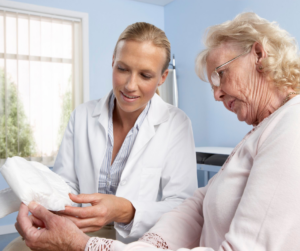Helping Seniors With Incontinence Issues
 The human body goes through several changes as we get older, and one of the most common concerns that some elderly people have is incontinence. Managing incontinence can be a difficult task, not just for seniors but also for the caregivers who assist them. For seniors who are experiencing incontinence, however, it is feasible to improve their quality of life by providing them with the appropriate knowledge and support. Throughout this blog, we will discuss a variety of issues of incontinence, offer helpful advice for seniors, and explore how a personal care at home aide can provide ongoing support.
The human body goes through several changes as we get older, and one of the most common concerns that some elderly people have is incontinence. Managing incontinence can be a difficult task, not just for seniors but also for the caregivers who assist them. For seniors who are experiencing incontinence, however, it is feasible to improve their quality of life by providing them with the appropriate knowledge and support. Throughout this blog, we will discuss a variety of issues of incontinence, offer helpful advice for seniors, and explore how a personal care at home aide can provide ongoing support.
Understanding Incontinence
Incontinence is a condition that occurs when a person loses control of their bladder or bowels, and it is a prevalent problem among the older generation. There are several categories of incontinence, the most common of which is stress incontinence. Urge incontinence, overflow incontinence, and functional incontinence are also conditions that seniors must contend with. When it comes to effective management, having a solid understanding of the specific type of incontinence is essential.
Helpful Advice for Seniors Dealing with Incontinence
While not all advice is relevant to every situation, the following tips can help loved ones and personal care at home aides support seniors with consistency and care:
- Pay Attention to Hydration: Although it may appear paradoxical, maintaining water intake is critical for general health. Unless specifically instructed to do so by a medical practitioner, seniors should not restrict their fluid intake, despite incontinence issues.
- Exercises for the Pelvic Floor: It may be a good idea for seniors to strengthen the muscles that are located on the pelvic floor, such as Kegels. Seniors should talk with their medical team to ensure they’re doing the exercises correctly or to ask about other options.
- Create a Schedule: It is possible to better manage incontinence by establishing a schedule for toilet breaks and scheduling them at regular intervals. Going to the restroom on a regular basis can help lessen the likelihood of accidents happening.
- Flexible Clothing: Wearing clothing that is simple to remove can make trips to the restroom more manageable. It is important to choose clothing that is appropriate for the situation. There are a variety of adaptive clothing options available for seniors who have difficulties moving around.
- Make Use of Incontinence Items: Seniors should be encouraged to make use of incontinence items such as adult diapers or pads in order to create a sense of security and steer clear of embarrassing situations. However, seniors might feel embarrassed simply by using these items, in spite of their advantages. With the support of personal care at home and loved ones, seniors can process their feelings, hopefully decreasing their reservations.
It is necessary to adopt a multidimensional strategy to assist seniors who are experiencing incontinence. This approach should include both practical advice for seniors themselves and empathetic assistance from the home care team. It is feasible to empower seniors to manage incontinence with dignity and confidence by encouraging open communication, obtaining the help of professionals, and making any required adjustments to their lifestyle.
Always keep in mind that the presence of a supportive and understanding environment is of the utmost importance in improving the general well-being of seniors who are dealing with incontinence concerns.
